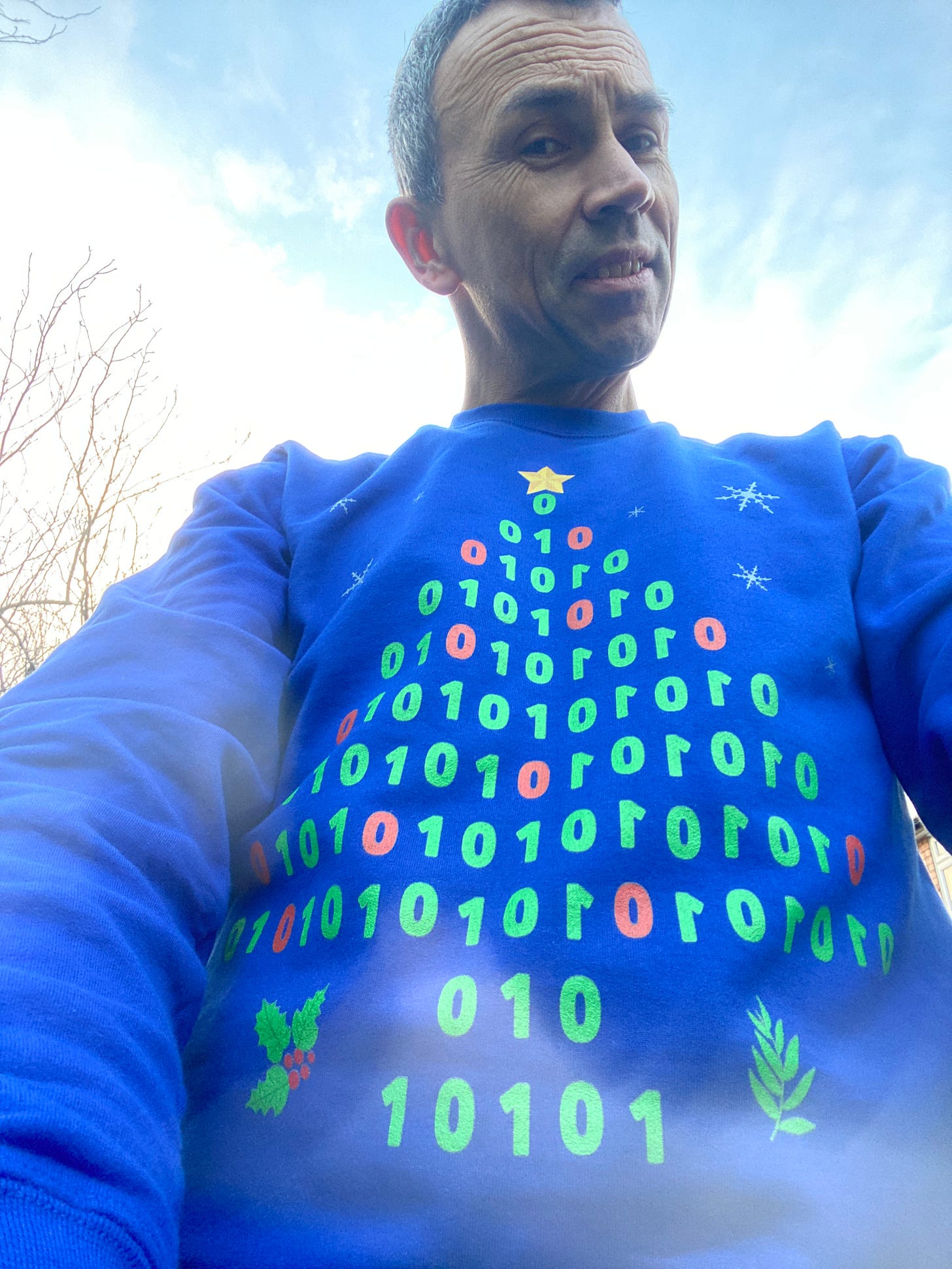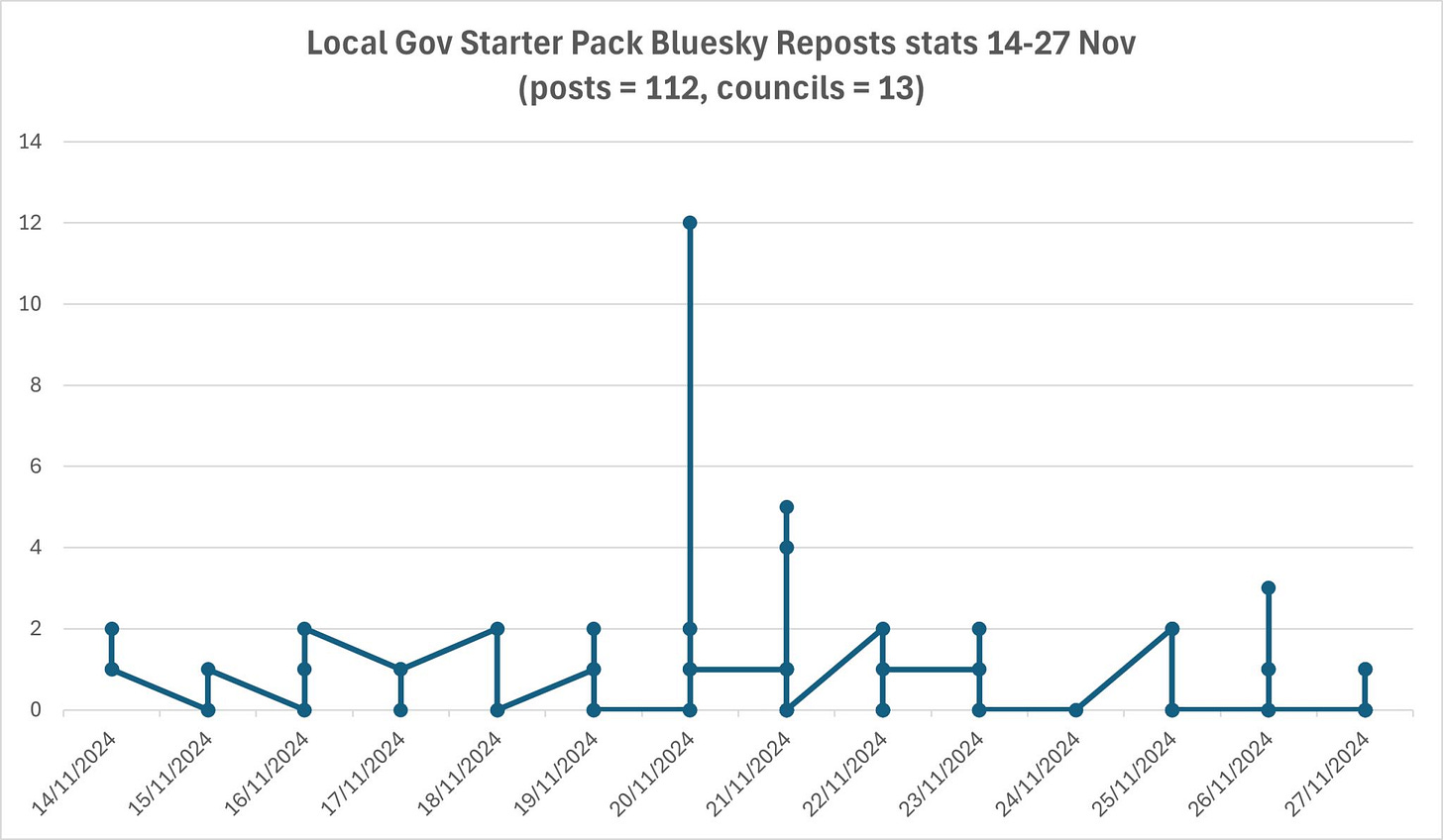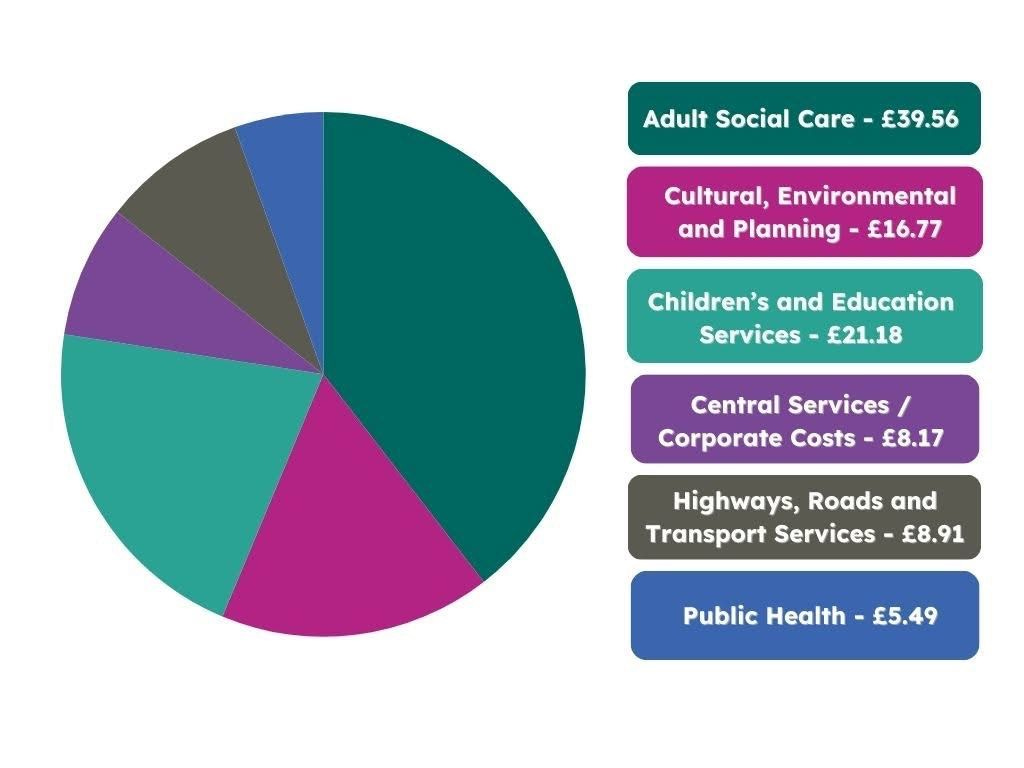Size up Bluesky with data, mining the Mail for 'woke' & why less is more for La Stocka
Plus... free December webinars, AI for cop comms, and new survey shows on-going evaluation headaches
Good luck to all UnAwards nominees!
As I write this I’m preparing to attend the UnAwards 2024 - the accessible public sector comms awards that everyone wants to win!
The standard of entries into this year’s Best Use of Data - sponsored by Whetstone Communications - has been a real step-up and gave judges Carla Ryan-Griffiths and Farid Norat a real challenge in choosing an outright winner.
Big thanks to them both - and good luck to everyone up for an Award.
Above is an exclusive peep at my festive jumper, set to get its debut tomorrow in Birmingham!
Using data to size up Bluesky
24m users and counting (see here for a live number). I have teamed up with Darren from comms2point0 to run a FREE webinar on Friday 13 December, highlighting seven steps to understanding more about this fast-growing platform that’s creating a buzz.
We’ll look at how it might fit into your social media strategies and tactics in 2025. We will cover whether this is a defining moment for a new platform, or just another distraction as we saw with Threads, which has 100 million downloads, but never really took off in the comms world. Bluesky feels different and we will explore why.
We have just hit 100 people registered, but there is still space.
In the meantime, I’ve taken a look at how engagement is doing for local gov accounts who have joined the platform. Examining 112 posts in the UK local authorities Starter Pack feed gives us some idea (with limitations) of the current state of play - which is minimal engagement (see above).
Early days, of course, but there seems to be a lot of content simply being lifted from other social channels and plonked onto Bluesky. Some have claimed their accounts but not posted yet. Read more here.
If you’ve dipped your toes in the water, how's engagement going for you? Do comment on my LinkedIn post and let me know.
And if you’re already on Bluesky you can follow me and Darren.
More December webinars!
Last call for ‘Award-winning numbers: Using data for a great cost of living campaign’. Thursday 12 December, 12-1pm. Sign up here.
We’re delighted to be welcoming Shelley Rawlings, Strategic Communications and Campaigns Lead at Buckinghamshire Council.
Shelley and colleagues scooped the first ever Best Use of Data award at the 2023 UnAwards for a campaign that delivered a tangible benefit for some of Buckinghamshire’s most vulnerable residents.
The Helping Hand campaign used data to really understand the target audience, and drawing on specialist colleagues, Shelley achieved a 240% increase in alternative fuel applications, a 59% increase in applying for EBSS, and over 2,000 payments made.
And if you are responsible for running behaviour change campaigns, why not join me and Dominic Ridley-Moy at this Behaviour Change Network webinar - Using AI for behaviour change insights. Fri, 13 Dec 2024 12:30 - 13:30. Sign up here.
How gut instinct can lead us astray
An interesting study has just been published that highlights the potential of data-driven Generative AI for helping us make better decisions - and the fallibility of humans.
A research article in the JAMA Network Open journal detailed an experiment involving 50 doctors. Half of them were paired with a ChatGPT-4 assistant from OpenAI and the other half without.
Diagnostic accuracy for the medics using Chat GPT Plus was 76.3%. This was considerably worse than Chat GPT Plus operating alone, which clocked diagnostic accuracy of more than 92%.
Study co-author, Adam Rodman, told the New York Times: “They didn't listen to AI when AI told them things they didn't agree with.”
What does this mean for comms pros?
It highlights the pitfalls involved in going with gut instinct and over-riding data and evidence.
While we aren’t making decisions that might seriously impact people’s health, in my work on data deep dives I’m presented with theories about video getting better engagement rates on organic social, and the optimum length of post for highest engagement.
When we dig into the data to test these things, we find no advantage of video over good images, and no correlation between post length and engagement rate. Other factors matter much more.
Using data can help you challenge the received wisdom of other stakeholders in your organization (bus advertising anyone?) and make the case for a more effective and data-informed course of action.
Data mining to tell stories
The Daily Mail is known for many headline grabbers, not least dubbing sandwiches woke. Who knew!
It got me thinking…. what else has the Mail called woke?
Thanks to a few data-scraping skills (you can cheat and use a few low-cost tools to do this for you), some cleaning, analysis and visualization, I can shed some light on the issue.
I scraped 20 pages of headlines from the online Mail’s Woke Culture section (yes, really), isolated all those with woke in the title, isolated words surrounding the word 'woke', and used AI to help me write the code to visualise it.
Just some of those things designated as ‘woke’ by the Daily Mail include police chiefs, activists, Bill Gates, academics, GPs, progressives and politicians.
Read more here.
What does this mean for comms pros?
Rebecca Roberts of Thread and Fable took this approach and ran with it for some great insight work into how the Daily Mail frames Gen Z - using some data scraping and AI for sentiment analysis.
That is a great example of what’s possible in terms of new understanding when you harness public datasets. Read more from Rebecca here.
I advise comms pros to harness curiosity and have a project if you want to get better at using and getting insight from data. And make it fun!
AI for cop comms in Grantham
Big thanks to the organisers and delegates at APComm Academy 2024 (held in deepest Grantham) for asking me to talk about how AI can be used beyond applications like rewriting content and generating images in Midjourney.
A few themes that emerged from the session:
Current excitement about AI in policing presents an opportunity for police comms pros to explore use cases.
Some 999 comms teams have access to Co-pilot and are starting to experiment
Things like AI Overview on Google Search mean they (and we) might need to start considering Large Language Models (LLMs) as stakeholders to be influenced
If you’re looking to harness AI to get the best from data and understand its potential for all aspects of strategic comms (not just the obvious), I can run online or in-person sessions.
Less is more for La Stocka
I was also struck by some recent dataviz Stockport Council (full disclosure, they are a recent client) produced for social media on a vital issue that affects up to 300,000 people - the proposed budget for next financial year.
Last year, I thought its dataviz on its budget proposals could have been better. It had a random use of colour (some of it hard to read), and included a bamboozling £132.953m figure - which might be okay for a balance sheet or the back pages of an Annual Report, but really not ideal for a key piece of public communication.
Fast forward to this year and things are much better because it appears a lot more considered. A more neutral, accessible palette with the confusing millions and decimals brought down to the more comprehensible scale of every £100 spent. This makes it easier to visualise where our (I am a resident!) money is going.
What does this mean for comms pros?
Producing dataviz is arguably easier than ever, especially with AI tools and a prevalence of data available in packages like PowerBI.
Top thinkers in this field like Cole Nussbaumer Knaflic tell us the best visualisation often starts in analogue - well away from the whizzy tools - where you can think about the audience and the most important message(s) you want to communicate.
As Cole says, we can get too attached to our creative work in tools like Canva, and not want to throw creations away, even when they fall short and don’t really justify themselves.
I think Stockport has produced something which supports - not distracts from - what the Council needs to achieve in securing engagement and feedback. They did this by taking some time to think about the audience before delving into the data at their disposal.
Mandy highlights data challenge for public sector comms
Well done Mandy Pearse MBA, FCIPR, FCIM on her latest Public Sector Digital Communications Benchmarking Report - a very important piece of work.
Mandy highlights Data Science and Analytics as one of the Top 5 training needs - and calls on Public Sector Comms Leaders to place greater emphasis on these skills.
One of the key findings is that measurement and evaluation remains simplistic, focusing on outputs rather than outcomes, impact and ROI.
Mandy’s findings reinforce what we've heard from the likes of CoverageBook about levels of data literacy in PR and comms. And also from those involved in training public sector communicators on how to deliver successful behaviour change campaigns: Data literacy in comms remains a big, sticky issue.
AI offers help and can do some heavy lifting, but it doesn't remove the need for a basic level of knowledge and understanding.
I’m looking forward to speaking to Mandy about ways we can help time poor, financially-constrained colleagues respond to the data skills challenge in 2025.
The whole report can be accessed by members of the Benchmarking Club, with breakdowns for NHS, Police, Fire and Rescue and Local Authority sectors available. Drop Mandy a line for more details.
Types of work I do, with people just like you
- Workshops: Supercharging comms with data - and harnessing AI
- Projects: Social media data deep dives, benchmarking and cutting through to ‘what works - with key recommendations to help make you more effective and efficient use of channels.
- Thought leadership: Keynote sessions on data in comms (and how AI can make this easier).
- Bespoke consultancy: Finding and taming data, weaving data into storytelling, data for advocacy and public affairs, data skills development and best practice.
If you want to make more use of data in 2025 and beyond, drop me a line at alex@whetstonecomms.com. I currently have availability from March 2025 onwards.
Data Communications Chronicles is written by Alex Waddington, founder of Whetstone Communications, which helps public sector and not for profit comms teams do more - and deliver more - using data.






